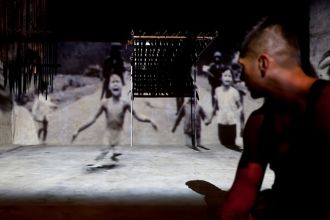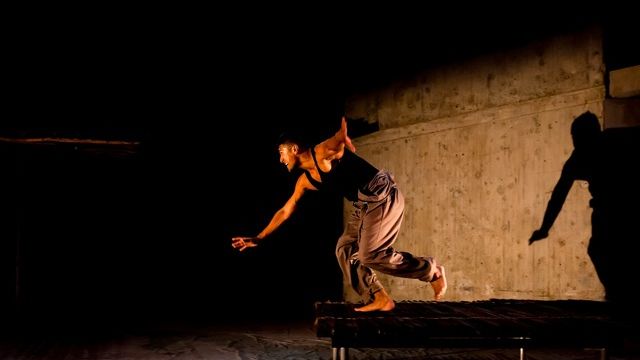Michael James Manaia
Michael James Manaia is a spirited work of compassionate humanity exquisitely presented by a real tour de force in actor Te Kohe Tuhaka.
This flawless, strikingly lit (Lisa Maule) work on a simple, practical and evocative set (Daniel Williams), places the actor in an environment where he can uncomplicatedly recount the early and maturing years of a pretty normal Maori bloke. This aspect of the work is lengthy, though engaging and spirited; importantly it frames the shattering contrast and desperately dark experience of Michael James Manaia as a soldier in Vietnam, from whence he returns an altered, and yes, irreparably damaged human being.
This is a very forthright experience - there is no irony of hindsight clouding the information or ambiguity teasing the audience. The actor, in action, has obviously been cocooned in character by way the work is written (John Broughton) and the Direction (Nathaniel Lees). Te Kohe Tuhaka does not specifically address the audience or seek pity or understanding. His story is presented with a kind of neutrality and purity of purpose. He commences the whole with a prayer and concludes the experience with a spiritual cleansing with water to dispel any demonic influences from the evoked horrors of war.
 With graphics of Vietnam, and particularly the famous photo of the naked girl running in the street, as backdrop prior to the commencement, there can be no doubt from the onset what is to be expected. Michael James Manaia’s generation was a generation barely separated from the Second World War by virtue of their parent’s experience of it and then they were fed into the Vietnam War and shockingly neglected on their return. And in Australia it has only really been in the last decade that they have found any significantly recognized voice. I assume this is much the same case in New Zealand. This work is a strong, elucidating, worthwhile addition to our understanding of the mostly hidden experience of the Vietnam Vets.
With graphics of Vietnam, and particularly the famous photo of the naked girl running in the street, as backdrop prior to the commencement, there can be no doubt from the onset what is to be expected. Michael James Manaia’s generation was a generation barely separated from the Second World War by virtue of their parent’s experience of it and then they were fed into the Vietnam War and shockingly neglected on their return. And in Australia it has only really been in the last decade that they have found any significantly recognized voice. I assume this is much the same case in New Zealand. This work is a strong, elucidating, worthwhile addition to our understanding of the mostly hidden experience of the Vietnam Vets.
I found myself impatient for a more biting experience as I was watching Manala’s early life unfold and was hungry for irony or some separation of actor from character and a more visceral connection. The visceral connection, with stunning use of sound (Maaka McGregor), does come but never the irony, just the brutal experiences, as undergone, recounted. To me the early part of the work is lengthy and the war experiences truncated by contrast. However in discussions after the performance I learned that others had completely contrasting experiences and just loved the passionate expressive young man portrayed with energy and exuberance and very happy did without a meta-narrative.
On opening night Te Kohe Tuhaka received a standing ovation and this work is comparable to the already ended No Child as a strong energetic one-person narrative that has the potential to deeply move.
Suzanne Sandow
Image credit: Taki Rua
Subscribe to our E-Newsletter, buy our latest print edition or find a Performing Arts book at Book Nook.

